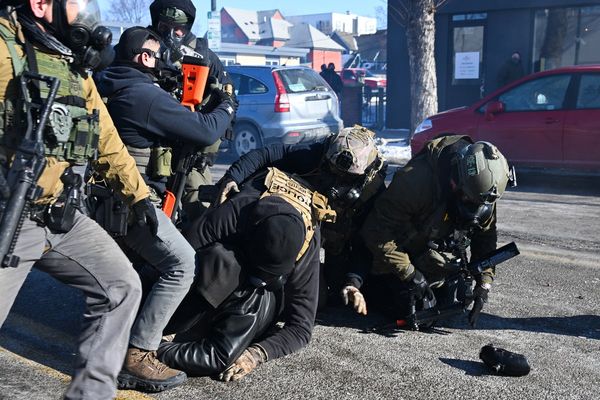
Former British prime minister Boris Johnson appeared before the Covid inquiry on Wednesday morning for the first of two days of questioning about his leadership of the country through the pandemic from 2020 to 2022.
Mr Johnson’s evidence had hardly begun when four protesters had to be ejected from the hearing room, saying his apologies for the mistakes of his administration were insufficient and had led to the loss of lives.
The former PM insisted he had done his “level best” to respond to the needs of the nation but that errors were inevitable due to the constantly evolving nature of the threat posed by the respiratory virus.
Mr Johnson faced tough questions on the stand and sometimes struggled to give credible answers under pressure from the inquiry’s counsel Hugo Keith KC.
Here are 10 points on which he found himself on a sticky wicket during Wednesday’s evidence.
Insists on commitment to transparency
Asked what his approach had been to the disclosure of his own Covid-related emails, WhatsApps and notes, Mr Johnson said: “I’ve done my best to give everything of any conceivable relevance.”
He was asked about an exchange of messages from 20 December 2021 between cabinet secretary Simon Case and his former principal private secretary Martin Reynolds in which Mr Case wrote: “PM is mad if he doesn’t think his WhatsApps will become public via Covid inquiry – but he was clearly not in the mood for that discussion tonight!”
Mr Johnson said: “I don’t remember that conversation to which the cabinet secretary is referring and I’ve handed over all the relevant WhatsApps.”
Cannot account for lost WhatsApp messages
About 5,000 WhatsApp messages on Mr Johnson’s phone from 30 January 2020 to June 2020 were unavailable to the inquiry.
Asked why, Mr Johnson answered: “I don’t know the exact reason, but it looks as though it’s something to do with the app going down and then coming up again, but somehow automatically erasing all the things between that date when it went down and the moment when it was last backed up.”
Mr Keith said a technical report provided by Mr Johnson’s solicitors suggested there may have been a factory reset at the end of January 2020 followed by an attempt to reinstate the contents in June 2020, but the former prime minister denied knowledge of that.
“I don’t remember any such thing,” he said.
Mr Johnson confirmed he had made plain during the legal battle between the Cabinet Office and the inquiry that his messages should be disclosed.
He added: “Can I, for the avoidance of doubt, make it absolutely clear I haven’t removed any WhatsApps from my phone and I’ve given you everything that I think you need.”
Admits mistakes made
Mr Johnson acknowledged that his government “may have made mistakes” in handling the pandemic.
“So many people suffered, so many people lost their lives,” he said.
“Inevitably in the course of trying to handle a very, very difficult pandemic in which we had to balance appalling harms on either side of the decision, we may have made mistakes.”
He continued: “Inevitably we got some things wrong [but] I think we were doing our best at the time, given what we knew, given the information I had available to me at the time, I think we did our level best.”
“Were there things that we should have done differently? Unquestionably.”
Declines to take blame for excess deaths
Mr Johnson said he was “not sure” whether government decision-making had led to “materially” a larger number of excess deaths as a result of the pandemic.
The former PM told Mr Keith: “I can’t give you the answer to that question, I’m not sure.”
He questioned the lead counsel’s statement that the UK was among the worst performers in Europe, insisting Britain was “well down the European table and well down the world table”.
Mr Keith responded that in “western Europe, we were one of the worst off, if not the second worst off”.
Mr Johnson, pressed again on why the UK had such a rate of excess deaths, said: “Irrespective of government action, we have an elderly population, extremely elderly population. We do suffer, sadly, from lots of Covid-related comorbidities and we are a very, very densely populated country. That did not help.”
Denies Dominic Cummings too powerful
Mr Johnson rejected suggestions that his government was designed to place Dominic Cummings, along with himself, as “decision-makers” while ministers were “largely irrelevant” to policy or execution.
“[Sajid] Javid has said in his witness statement that the Cabinet was designed, in his view, to place Dominic Cummings and the prime minister as the decision-makers, to centralise power in Number 10 and, in his own witness statement, Mr Cummings has said that the cabinet was largely irrelevant to policy or execution on account of the leaks, your inability to chair it and because it was seen by No 10 as not being a serious place for serious discussion,” Mr Keith said.
Mr Johnson replied: “I don’t think that’s true. I think there were some really excellent cabinet discussions about the trade-offs.”
But he claimed that the cabinet as a whole was “more reluctant” to impose non-pharmaceutical interventions than he was.
“That wasn’t true for every member of the cabinet but that would be a general comment,” he added.
Admits Sage guidance rarely read
Mr Johnson told the inquiry he may have only read Scientific Advisory Group for Emergencies (Sage) minutes “once or twice”.
Asked whether he ever read the minutes, the former prime minister said: “I think I did once or twice look at the – maybe more than that – looked at what Sage had actually said and Sage certainly produced a lot of documentation.
“But I think that the CSA [chief scientific adviser] and CMO [chief medical officer] did an outstanding job of leading Sage and distilling their views and conveying them to me.”
He added: “in retrospect it may have been valuable to hear the Sage conversation unpasteurised itself, but I was more than content with the very clear summaries that I was getting from the CSA and the CMO.”
Mr Keith countered: “Did you not think of looking at the scientific horse in the mouth and seeing what was actually said by the government’s primary scientific advisory committee on these issues when you, as now appears to be the case, you became engaged particularly in the debate of behavioural fatigue? Why didn’t you call for the primary material?”
Mr Johnson replied: “I think that’s a good question. I was very, very much impressed by and dependent on the CMO and the CSA, both of whom are outstanding experts in their field and it felt to me that I couldn’t do better than that.”
Admits meetings too male-dominated
Mr Johnson conceded that the gender balance of his top team should have been “better”.
He said he had a gender balance in his staff while mayor of London, describing his office as “very harmonious”.
“I think that the gender balance of my team should have been better,” he told the inquiry of his time as prime minister during the pandemic.
“I think sometimes during the pandemic, too many meetings were too male-dominated if I’m absolutely honest with you.”
Defends retaining Matt Hancock
Mr Johnson defended keeping former health secretary Matt Hancock in his post, despite calls from his aide Dominic Cummings that he should have been sacked.
Mr Johnson said: “If you’re prime minister, you are constantly being lobbied by somebody to sack somebody else. It’s just what, I’m afraid, happens and it’s part of life.”
He acknowledged Mr Cummings had a “low opinion” of Mr Hancock but “I thought he was wrong”.
“I stuck by the health secretary. I thought the health secretary worked very hard.”
He said Mr Hancock “may have had defects [but] I thought that he was doing his best in very difficult circumstances and I thought he was a good communicator”.
Dismisses criticism of senior officials
Mr Johnson dismissed the exasperated messages exchanged between senior officials Mark Sedwill and Mr Case.
In July 2020, Mr Case, the then-head official in Downing Street and now the cabinet secretary, said. “I’ve never seen a bunch of people less well-equipped to run a country”, in a message to Sir Mark, who was cabinet secretary at the time.
But Mr Johnson said Whitehall mandarins would have said similar “pretty fruity” things about the Thatcher administration if their “unexpurgated” messages had been available in the same way as WhatsApp exchanges now.
He said WhatsApp messages tended to be “ephemeral, it tends to the pejorative and the hyperbolical”.
“I think that the worst vice, in my view, would have been to have had an operation where everybody was so deferential and so reluctant to make waves that they never expressed their opinion, they never challenged and they never doubted.
“It was much more important to have a group of people who are willing to doubt themselves and to doubt each other. And I think that that was creatively useful rather than the reverse.”
Admits Covid threat underestimated
Mr Johnson conceded that the wider government had “underestimated” the threat posed by Covid-19.
He told the inquiry: “I think that it would certainly be fair to say of me, the entire Whitehall establishment, scientific community included, our advisers included, that we underestimated the scale and the pace of the challenge. You can see that very clearly in those early days in March.
“We were all collectively underestimating how fast it had already spread in the UK. We put the first peak too late, we thought it would be May/June – that was totally wrong. I don’t blame the scientists for that at all. That was the feeling and it just turned out to be wrong.”
Additional reporting by agencies







